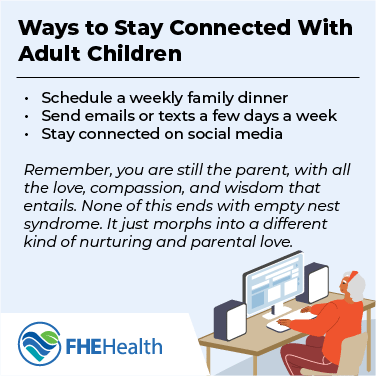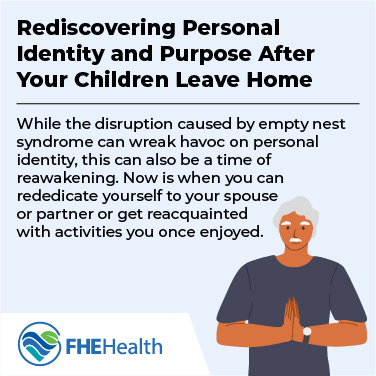
The world does not end when children grow up and leave home, but the mental health stresses that parents may experience during this significant life change can prove challenging. For parents facing the scary prospect of their kids’ departure to go off and make a new life, some things can be done to help couples cope with empty nest syndrome.
Understanding the Impact of an Empty Nest
What can be worse than coming home to a house that no longer rings with the familiar family laughter and chaos? This is unexpected and hurts in ways most parents cannot immediately understand. Empty nest syndrome can feel like a dull ache in the heart or a stabbing pain that can be misinterpreted as a symptom of physical illness.
Dr. Beau A. Nelson, DBH, LCSW, Chief Clinical Officer at FHE Health shares that “many people are not prepared for the changes that may occur when children “fly away” and it is important to stay connected to supports and seek out professional assistance if this is a difficulty that is not navigated well.”
Parents often say they wonder what happened to all those years. How could time pass so quickly? It seemed like yesterday when the children were babies. The worse mental health challenges revolved around lack of sleep, worry that the child’s cough meant something serious, planning for their children’s future, and scrimping to shower them with gifts and experiences—and lots of love.
Now, all that has changed seemingly overnight. Parental identity is at a crossroads. Something must be done. But what?
What Is Empty Nest Syndrome?
Researchers have defined empty nest syndrome as a transitional stage, a time when middle-aged parents are in the process of supporting their children’s movement into adulthood and out of the house. Empty nest syndrome is a psychological condition that can affect both parents, not just one.
Does Empty Nest Syndrome Exist?
Some research suggests that empty nest syndrome is exaggerated and overblown. However, there are risks to downplaying the condition, too, since this mental health reality can often co-occur with children leaving home.
When couples no longer share child-rearing activities and are confronted with the empty nest syndrome, their relationship may deteriorate. This critical turning point may cause the couple to reassess their marriage or partnership. Some marriages do not survive and result in divorce.
On the other hand, some couples who have remained together “for the sake of the children” realize they have no viable reasons to stay in the marriage once their children are gone. They may have planned to divorce after their kids leave and their day-to-day parenting duties cease, or it may become the only option now that they want to lead their lives independently.
What Are the Psychological Effects of an Empty Nest?
Not only do parents feel lonely now that the house is silent, but they can also experience distress over this sudden life change. Marital tensions often increase, with frequent bickering, loss of interest in shared experiences, and an inability to find joy and pleasure. The sense of loss may be so profound that no amount of caring concern from one parent to the other can lessen the grief and pain.
Coping With Feelings of Loss and Grief
 Parental emotions can fluctuate once children move out and the regular everyday family routine is upended. While parents may be proud and supportive of their kids going off to college, working in another state, getting married, and moving out alone, they may also experience mental health challenges. These feelings typical of empty nest syndrome include unexpected grief and loss, depression, and anxiety.
Parental emotions can fluctuate once children move out and the regular everyday family routine is upended. While parents may be proud and supportive of their kids going off to college, working in another state, getting married, and moving out alone, they may also experience mental health challenges. These feelings typical of empty nest syndrome include unexpected grief and loss, depression, and anxiety.
Some coping strategies that may help include:
Take the time to cry. This does not mean wallowing in grief, but crying allows you to feel the sadness. By honoring this feeling, you avoid stuffing it down to do more mental health damage. It will never feel good, but the grief and sorrow will slowly disappear.
Go on a trip. Some couples take a long-delayed vacation together to herald one of several significant life transitions. According to experts, travel can offer mental health benefits to couples experiencing empty nest syndrome. These include renewed energy, a boost in creativity, sharper focus, and improvements in attention and empathy.
Plan an event or activity with the child who has left home. What did the child enjoy doing most with the family? Once you know when they will visit again, add a fun event to the scheduled visit. Be flexible, though, as kids returning home may have other plans for their time.
Paint their room. Some parents make the mistake of keeping their adult child’s room like it was, almost as a shrine. This only prolongs the grief and mental health issues stemming from empty nest syndrome. Redecorating, painting, or making the room into a hobby space or office, isn’t replacing your child but recognizing a new chapter in your life.
Avoid the tendency to tell your child what to do. They need to learn from experience. And they will, just as you did when you left your parent’s home.
Fill in the hours of the day. Instead of sitting at home and revisiting old times, get busy doing things that require attention or can put you in contact with friends. Clean out closets, donate items to charity, shop for a new wardrobe or hairstyle makeover, host a card, cooking, or dinner party.
Recognize that many adult children may make their way back home. Called the “boomerang effect,” this happens when the children who’ve left experience financial difficulties, their careers suddenly transition or end, or they have a mental health or physical condition that they’re unprepared to deal with. Your parenting duty is to gently and gradually encourage them to stand independently.
Finding Ways to Stay Connected With Adult Children
Parenting does not suddenly end with the children’s departure, but it does take on a different meaning in everyday living. Freed from the daily chauffeuring of children to school, sports, and leisure activities, one or both parents may find a void in their lives that they struggle to fill. While it may be easier for working parents to dismiss the feelings of depression and anxiety, there is still grief at the core of the empty nest syndrome they’re going through.
Sure, there is no longer constant communication between parents and their children, such as conversations at the dinner table, going to church, and other activities parents share with the kids growing up. But there are ways to stay connected with adult children that can help bridge the gap and ease the emptiness.
Some ways to stay connected include:
Schedule a weekly family dinner.
Send emails or texts a few days a week to keep the kids informed about what is happening at home.
Post photos and highlights of events in the parents’ lives on social media.
Respond to adult children’s social media posts—but do not be intrusive.
Remember, you want your adult children to know that you support their educational pursuits and their emergence into discovering their full potential. Sometimes, your parenting role may be more akin to a mentor, yet you are still the parent, with all the love, compassion, and wisdom that entails. None of this ends with empty nest syndrome. It just morphs into a different kind of nurturing and parental love.
Rediscovering Personal Identity and Purpose
 While the disruption caused by empty nest syndrome can wreak havoc on personal identity and result in a cascade of mental health problems, including grief, depression, and anxiety, this can also be a time of reawakening.
While the disruption caused by empty nest syndrome can wreak havoc on personal identity and result in a cascade of mental health problems, including grief, depression, and anxiety, this can also be a time of reawakening.
Consider how often you set aside your desires for sexual intimacy and companionship with your spouse or partner because of the crush of parenting duties. Now is when you can rededicate yourself to ignite that spark between you and your spouse. It may initially seem artificial since it’s likely been a while since you actively pursued amorous play together. Still, like other normal and natural activities, it will quickly return to you.
Now that you have more time to yourself, you can also get reacquainted with the things you once enjoyed so much. Whether it’s a leisure activity or educational goal, or you’re undecided about what to do next, make it a point to discover new things.
Seeking Professional Help When Needed
Having a support system in place to help strengthen parental resilience and improve the family’s well-being is an essential coping strategy. Challenging life transitions, including dealing with empty nest syndrome, may cause increased stress, the development of depression and anxiety, low self-esteem, and loss of a sense of purpose.
It is completely okay to consult a mental health professional to help you navigate empty nest syndrome, especially if you struggle to cope with the big three: grief, depression, and anxiety. It takes time, yet you will heal and become stronger.







